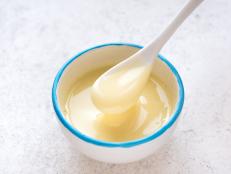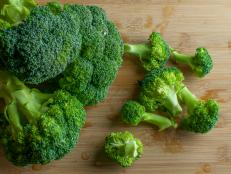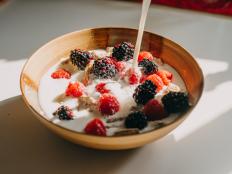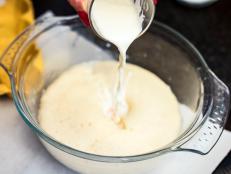3 Trendy “Milks” You’ve Probably Never Heard Of
A nutritionist takes a look at the newest alternative milk beverages.

baibaz
Although you may hear about milks like hemp and oat, there are some more exotic varieties that are probably off your radar. Here are three milks you probably won’t find in your supermarket that you may want to give a try.
Camel Milk
Nutritionally, camel milk is pretty close to human milk. Unlike other milks, it‘s naturally lower in natural sugars and cholesterol, and high in sodium, potassium, iron, copper, zinc, magnesium and vitamin C. Camel milk also provides 10% the daily recommendation for protein, 30% for calcium, and 70% of thiamin. A review study published in 2015 examined the safety of camel milk in children, and found that there are some positive ways camel milk can help with the treatment of autism and the overall well-being in children.
If you want to give it a whirl, Desert Farms sells camel milk, camel milk kefir, camel milk powder, and hump fat online. A 16-ounce bottle of camel milk is a whopping $18. The website touts that their milk is raw (unpasteurized), so I would not recommend it for children or those with a lowered immune system (like pregnant women or older adults).
Quinoa Milk
Milk from this seed has few reports of allergies or intolerances. Quinoa consists of about 9 to 18-percent protein but compared to cow’s milk, it only provides about half the amount of protein per serving. A one cup serving provides 70 calories, 1 gram of fat, 2 grams of protein, 12 grams of carbs and 2 grams of sugar. Quinoa milk can be found fortified and therefore has comparable amounts of vitamin A and D as found in cow’s milk.
A report published in LWT Food Science and Technology examined the characteristics of quinoa milk, and determined it may be a good alternative for those with food allergies and intolerances. However, it should be noted that the 2015-2020 dietary guidelines for Americans does not recognize plant milks, except soy, to count towards the recommended three daily servings of dairy.
Quinoa milk is produced by Suzie’s Quinoa Milk and can be found in online grocers. It sells for about $3.99 for a 32 ounce container. It’s available in unsweetened, unsweetened vanilla, and vanilla.
Cockroach Milk
The milk of this insect has been making recent headlines. It’s derived from the female Pacific beetle cockroach who feeds her young a pale, yellow liquid “milk” found in her brood sack. The milk appears as crystals and is extremely labor intensive to harvest a substantial amount. The milk itself is about 16 to 22-percent fat and is comparable in protein to milk harvested from mammals.
Although you may be brave enough to give this bevie a try, you won’t find it at your local market or even specialty market. It’s even difficult to find it sold online, but you never know what the future may bring.


































